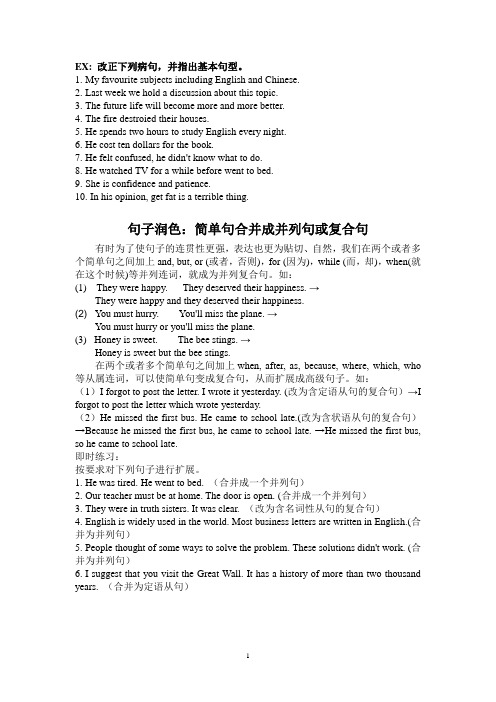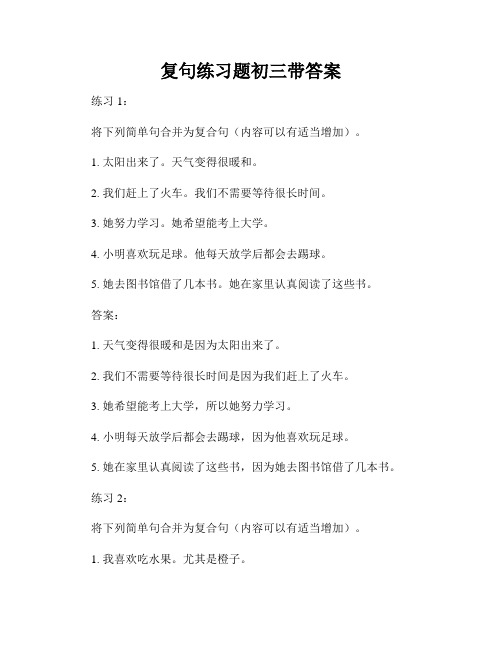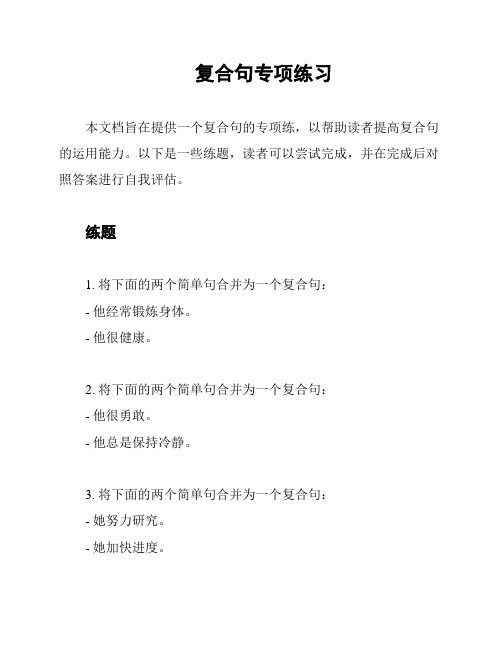简单句合并成复合句
- 格式:pdf
- 大小:1.95 MB
- 文档页数:14

专项培优:Unit1语法拔高练习一、将下列两个简单句合并成一个含有非限制性定语从句的复合句。
1. I am reading Harry Porter. It is an interesting book. →____________________________________________2. He failed in the exam. It made his parents very angry. →____________________________________________3. He has two sons. Both of them are doctors. →____________________________________________4. Recently I bought an ancient Chinese vase.The price of it was very reasonable. →____________________________________________5. Last week, two persons came to see the house.Neither of them wanted to buy it.→____________________________________________6. I have lost the pen.My father bought it for my sixteenth birthday. →____________________________________________7. Do you see the house? The windows of it face south.→____________________________________________8. He must be from Africa. It can be seen from his skin.→____________________________________________9. The book is worth reading. He paid 6 yuan for it. →____________________________________________10. She is a teacher of much knowledge.Much can be learned from her. →____________________________________________二.单项选择1. Attention! Our bus is approaching Cambridge,________we’ll be stopping to eat.A. whenB. whichC. asD. where2. People who seldom do sports or _______diet is high in fat will put off Weight quickly.A. whoB. whoseC. whichD. what3. The novel was completed in 1978, the economic system has seen great changesA. whenB. during whichC. since thenD. since when4. Could it be in the restaurant in _________ you had dinner with me yesterday ________ you left behind your keys and wallet?A. which;whichB. which;thatC. that;whereD. where;where5. Part of Southeast Asia was struck by floods,________ effects the people are still suffering from.A. thatB. whoseC. thoseD. what6. The British are not so familiar with different cultures and other ways of doing things,________ is often the case in other countries.A. whatB. asC. soD. that7. Soon children in the camp had many new friends, ______ they shared food, stories and projects.A. for whichB. with whomC. of whichD. to whom8. The Great Wall is the place ______ almost all tourists would like to visit when they come to Beijing.A. whyB. whichC. whenD. where9. The professor can hardly find sufficient grounds his argument.A. which to be based onB. on which to baseC. which to be basedD. which to base10. About 1.62 million Chinese students went abroad to study between 1978 and 2009, ______ only 497,400 have come back.A. whoB. among whomC. among whichD. in whom11. I prefer a company ________ people have to work as a team, instead of fighting against each other.A. whereB. thatC. asD. when12. —Is this the house_______ you often talk about?—Yes, just the one _______ you know I used to live for more than 15 years.A. that; whereB. which; thatC. where; whichD. where; that13. As a result of our serious staff shortages, the situation has risen _______ we have to hire graduating collage students for help.A. thatB. whenC. whereD. as14. Do you have enough money _______ to buy that fashionable dress?A. for whichB. which usesC. with whichD. which15. I travel to the Binhai New Area by light railway every day, do many businessmen who live in downtown Tianjin.A. asB. whichC. whenD. though16. Qingdao is the most satisfactory place _____ we’re going to visit.A. whichB. whereC. thatD. in which17. Could it be in the restaurant in _________ you had dinner with me yesterday ________ you left behind your keys and wallet?A. which;whichB. which;thatC. that;whereD. where;where18. The old lady, all of ______ children had been killed in the earthquake, was given help by the local government.A. herB. whomC. whoseD. which19. Let me think of a proper situation _______ this sentence can be used.A. whereB. thatC. of whomD. which20. There are three libraries in our school, _______ were built five years ago.A. all of themB. either of themC. all of whichD. both of that21. They’ve won their last three matches,________I find a bit surprising actually.A. thatB. whenC. whatD. which22. China’s new food law provides for a food recall system ________ producers have to stop production if their food isn’t up to standards.A. whereB. thatC. whenD. which 三.翻译句子1. 他经常迟到,这让他的老师很生气。

EX: 改正下列病句,并指出基本句型。
1.My favourite subjects including English and Chinese.st week we hold a discussion about this topic.3.The future life will become more and more better.4.The fire destroied their houses.5.He spends two hours to study English every night.6.He cost ten dollars for the book.7.He felt confused, he didn't know what to do.8.He watched TV for a while before went to bed.9.She is confidence and patience.10.In his opinion, get fat is a terrible thing.句子润色:简单句合并成并列句或复合句有时为了使句子的连贯性更强,表达也更为贴切、自然,我们在两个或者多个简单句之间加上and, but, or (或者,否则),for (因为),while (而,却),when(就在这个时候)等并列连词,就成为并列复合句。
如:(1) They were happy. They deserved their happiness. →They were happy and they deserved their happiness.(2) You must hurry. You'll miss the plane. →You must hurry or you'll miss the plane.(3)Honey is sweet. The bee stings. →Honey is sweet but the bee stings.在两个或者多个简单句之间加上when, after, as, because, where, which, who 等从属连词,可以使简单句变成复合句,从而扩展成高级句子。

复句练习题初三带答案练习1:将下列简单句合并为复合句(内容可以有适当增加)。
1. 太阳出来了。
天气变得很暖和。
2. 我们赶上了火车。
我们不需要等待很长时间。
3. 她努力学习。
她希望能考上大学。
4. 小明喜欢玩足球。
他每天放学后都会去踢球。
5. 她去图书馆借了几本书。
她在家里认真阅读了这些书。
答案:1. 天气变得很暖和是因为太阳出来了。
2. 我们不需要等待很长时间是因为我们赶上了火车。
3. 她希望能考上大学,所以她努力学习。
4. 小明每天放学后都会去踢球,因为他喜欢玩足球。
5. 她在家里认真阅读了这些书,因为她去图书馆借了几本书。
练习2:将下列简单句合并为复合句(内容可以有适当增加)。
1. 我喜欢吃水果。
尤其是橙子。
2. 她受伤了。
所以她不能参加比赛了。
3. 我演奏了钢琴。
大家鼓掌表示赞扬。
4. 他迟到了。
他必须写一个道歉信。
5. 她买了一本好看的小说。
她准备在周末读完它。
答案:1. 我喜欢吃水果,尤其是橙子。
2. 她受伤了,所以她不能参加比赛了。
3. 我演奏了钢琴,大家鼓掌表示赞扬。
4. 他迟到了,所以他必须写一个道歉信。
5. 她准备在周末读完它,因为她买了一本好看的小说。
练习3:将下列简单句合并为复合句(内容可以有适当增加)。
1. 他喜欢旅行。
他觉得旅行可以开阔眼界。
2. 我们要练习英语口语。
这对我们来说很重要。
3. 她不爱吃蔬菜。
她觉得它们没有味道。
4. 她下雨了。
她不能出去散步了。
5. 他很忙。
他一直在准备考试。
答案:1. 他觉得旅行可以开阔眼界,所以他喜欢旅行。
2. 这对我们来说很重要,所以我们要练习英语口语。
3. 她觉得它们没有味道,所以她不爱吃蔬菜。
4. 她不能出去散步了,因为下雨了。
5. 他一直在准备考试,所以他很忙。
练习4:将下列简单句合并为复合句(内容可以有适当增加)。
1. 她花了很多时间准备晚餐。
晚餐非常美味。
2. 他学习数学很认真。
他希望能考高分。
3. 我们遇到了一个问题。

汉语转换生成语法规则例子(一)汉语转换生成语法规则在自然语言处理领域,汉语转换生成语法规则是一种常用的技术方法,用于将输入的汉语句子转换成特定的结构或语法形式。
这种技术在机器翻译、信息提取和自然语言理解等领域都有广泛的应用。
一、生成疑问句生成疑问句是汉语转换生成语法规则中常见的应用之一。
通过转换生成规则,我们可以将陈述句转换成疑问句,以达到提问的效果。
例如,对于以下陈述句:•陈述句:他在图书馆看书。
•疑问句:他在哪里看书?通过应用转换生成规则,可以将陈述句转换成疑问句。
在上述例子中,我们将“他在图书馆看书”转换成了“他在哪里看书?”这样的疑问句形式。
二、生成否定句除了生成疑问句外,汉语转换生成语法规则还可以用来生成否定句。
通过转换生成规则,我们可以将肯定句转换成否定句,以达到否定的效果。
•肯定句:我喜欢吃冰淇淋。
•否定句:我不喜欢吃冰淇淋。
通过应用转换生成规则,可以将肯定句转换成否定句。
在上述例子中,我们将“我喜欢吃冰淇淋”转换成了“我不喜欢吃冰淇淋”这样的否定句形式。
三、生成被动句除了生成疑问句和否定句外,汉语转换生成语法规则还可以用来生成被动句。
通过转换生成规则,我们可以将主动句转换成被动句,以强调句子的动作接受者。
例如,对于以下主动句:•主动句:我吃了一块蛋糕。
•被动句:一块蛋糕被我吃了。
通过应用转换生成规则,可以将主动句转换成被动句。
在上述例子中,我们将“我吃了一块蛋糕”转换成了“一块蛋糕被我吃了”这样的被动句形式。
四、生成复合句汉语转换生成语法规则还可以用于生成复合句,即由两个或多个简单句组成的句子。
通过转换生成规则,我们可以将简单句转换成复合句,以表达更复杂的语义关系。
•简单句1:我喜欢吃水果。
•简单句2:我每天都买很多水果。
通过应用转换生成规则,可以将简单句转换成复合句。
在上述例子中,我们可以将简单句1和简单句2合并成复合句:“我喜欢吃水果,所以我每天都买很多水果。
”五、生成条件句最后,汉语转换生成语法规则还可以用于生成条件句。

简单句练习非常重要,认真完成!!!! 不懂就问!!1.改写句子:1.The swimming pool will be completed in one month.____________________________________________________ 否定句____________________________________________________ 一般疑问句____________________________________________________ 特殊疑问句2.This building was built about 100 years ago.____________________________________________________ 否定句____________________________________________________ 一般疑问句____________________________________________________ 特殊疑问句3.She can go to school by bus alone.____________________________________________________ 否定句____________________________________________________ 一般疑问句____________________________________________________ 特殊疑问句4.Tom gets up at 6:00 everyday.____________________________________________________ 否定句____________________________________________________ 一般疑问句____________________________________________________ 特殊疑问句5.He always does his homework at school.____________________________________________________ 否定句____________________________________________________ 一般疑问句____________________________________________________ 特殊疑问句6.I have a few friends in Shenzhen.____________________________________________________ 否定句____________________________________________________ 一般疑问句____________________________________________________ 特殊疑问句7.He has been to Beijing two times.____________________________________________________ 否定句____________________________________________________ 一般疑问句____________________________________________________ 特殊疑问句8.Peter had his bike repaired last week..____________________________________________________ 否定句____________________________________________________ 一般疑问句____________________________________________________ 特殊疑问句3.句子翻译(注意时态语态)他去北京.-→他去北京旅游. →他一个人去北京旅游. →他一个人坐火车去北京旅游. →他去年夏天一个人坐火车去北京旅游. →他去年夏天用打工挣的钱一个人坐火车去北京旅游._________________________________________________________________________1.我花了一个小时的时间步行去公园.2.据说南京长江上又在建一座桥.3.汤姆跑得好快,我赶不上他.4.你越运动,越健康.5.我们有信心,美好的梦想一定能成为现实.6.我的自行车坏了,我要请人修一下.7.我不太清楚怎样回答这个问题.8.张老师不但是我们的老师,而且是我们的朋友.9.当我回到家的时候,我妈妈已经把饭做好了.10.在我第一次遇见你的地方有一家不大的书店.11.明天晚上如果你去参加聚会,我也去.12.虽然他只有5岁,但是他能说很棒的英语.13.如果有病,必须马上就医.14.昨天你去他家,看见了他花园里的那些红玫瑰和白玫瑰了吗?15.回答这个问题相当难.16.昨天回家的路上,我看见几个男生在打篮球.17.有一头牛在过马路18.这里过去有一棵苹果树..19.过去有人相信地球是圆的.20.我爸爸有早睡早起的习惯.4.将下列简单句合并为复合句:(从句非谓语介词短语等)例如:The building is very famous.The building was built 100years ago.The building (which was) built is very famous.1.Walden Pond is now the site of many tourist stands.It was once praised by Thoreau for its natural beauty.2.Almost every summer night the cooling northeast wind swept through our bedroom windows.It made air-conditioning unnecessary.It made a light blanket welcome.3. This is a good spot for a picnic.A river flows on one side.A large tree provides shade.We can spread our blanket on the grassy knoll.4.Mr Wood ran up the stairs.He was panting for breath.He stood at his neighbour’s door.He knocked again and again.The someone opened the door.5.Jim stood in front of the mirror.He looked at his image.He wondered at the big change.It had come over him in recent years.6.He had greatly wronged his only daughter.She might never forgive him.This idea almost drove him mad.7.The story is written in plain language.It consists of three parts.It has an interesting plot.The plot centers round an old aristocratic family.The family lived in 17th-century France.8.The old man stopped down the street.He leaned against a lamp-post.He listened to s song.The song was cheerful.It came out from a restaurant.The restaurant was on the opposite side of the street.9.Mr. Jacob was Tony’s former employer.He had promised Tony a half-day job.The job would give Tony 20 pounds a week.It was necessary to break this news to his family, Tony thought.10.He might have wronged his friend.His friend had offered him good advice on many occasions.This thought troubled his mind.His mind had already been overburdened with worries and cares.11.For many years London has been a business center.The business center has hotel accommodation.The hotel accommodation is for visiting businessmen.It is also for other well-to-do travelers.It is completely inadequate for the swarms of short-stay tourists.They land at Heathrow.They disembark at Dover.12.He was nearing the top.His eyes were already glowing with triumph.He was climbing faster and faster.He suddenly slipped and fell.He tumbled to the ground.。

复合句专项练习
本文档旨在提供一个复合句的专项练,以帮助读者提高复合句的运用能力。
以下是一些练题,读者可以尝试完成,并在完成后对照答案进行自我评估。
练题
1. 将下面的两个简单句合并为一个复合句:
- 他经常锻炼身体。
- 他很健康。
2. 将下面的两个简单句合并为一个复合句:
- 他很勇敢。
- 他总是保持冷静。
3. 将下面的两个简单句合并为一个复合句:
- 她努力研究。
- 她加快进度。
4. 将下面的两个简单句合并为一个复合句:
- 他跑得很快。
- 他很快就追上了。
5. 将下面的两个简单句合并为一个复合句:
- 她把书放在桌子上。
- 她走了出去。
参考答案
1. 他经常锻炼身体,所以他很健康。
2. 他很勇敢,而且他总是保持冷静。
3. 她努力研究,以加快进度。
4. 他跑得很快,结果很快就追上了。
5. 她把书放在桌子上,然后走了出去。
请读者完成以上练,并对比答案进行自我评估。
通过不断练,读者将逐渐提高复合句的应用能力。
祝练习顺利!。
初中英语句型转换专题练习不少单项填空题干是由学生并不那么熟悉的句式构成的,这无形中增加了试题的难度。
要答好这类试题,就必须设法将复杂的、不常见的句式还原成简单的、常见的句式,以便快速地把握句子结构,理解题目意思。
我们先来看看句型转换的最基本的几个方法:一、肯定句改否定句的方法。
1、在be动词后加not。
如:is not,are not,am not,was not,were not;2、在情态动词can,should,will等后加not。
如:cannot,should not,will not;3、上述都没有的,在动词前加助动词否定形式don’t/ doesn’t/ didn’t。
4、some 改成any。
二、肯定句改一般疑问句的方法。
1、把be动词放在句首,剩下的照抄,(some 改成any,my改成your等)句点改成问号。
2、把can,shall,will等放到句首,剩下的照抄,(some 改成any,my改成your等)句点改成问号。
3、上述都没有的,在句首请助动词Do/Does/Did帮忙,剩下的照抄,(some 改成any,my改成your等)句点改成问号。
三、肯定句改特殊疑问句的方法——四步法1、在一般疑问句的基础上,句首添加一个疑问词即可,可根据划线部分确定是什么疑问词。
2、接着找be动词或can,shall,will等放在疑问词后面,若没有则请助动词do/does/did帮忙,写在疑问词后面,how many除外,必须先写物品,再写be动词等。
3、划线部分去掉后剩下的内容照抄,(some 改成any,my改成your等)4、句点改成问号。
句型转换主要有以下几种:1. 将陈述句改成疑问句;2. 就划线部分提问;3. 将简单句合并成复合句;4. 将肯定句变成否定句;5. 将主动语态变成被动语态;6. 直接引语变成间接引语7. 将复合句还原成简单句;8. 同义句转换。
第一种、将陈述句变成疑问句。
翻译技巧之合并合并一般说来,英语句子要比汉语句子长,英译汉时切分用得较多;但是较口语化的英语句子也比较短,英译汉时有时也得用合并。
合并常用于以下二种情况:(一)简单句与简单句的合并把原文中的两个或两个以上的简单句合并成一个句子。
例如:(1)She is intelligent,ambitious and hard-working. She is also good at solving problems.她很有才智、雄心勃勃、工作努力,还善于解决问题。
(两句合一)(2)The door was unlocked. She went inside and sat in a stupor. She was near collapse,barely able to move her swollen feet.门没锁上,她走了进去,呆呆地坐了下来,极度的衰弱几乎使她无力挪动她那红肿的双脚。
(三句合一)(3)I pulled up a chair and sat down. I sat with my legs wide apart at first. But this struck me as being irreverent and too familiar. So I put my knees together and let my hands rest loosely on them.我把椅子挪过去坐下,开始两脚分开,但我突然觉得这样显得不尊重,太不拘礼节,便把两膝并拢,把双手随便地放在膝盖上。
(四句合一)(二)复合句的合并把原文中的主从复合句或并列复合句译成一个简单句或词组。
例如:(1)We are going to have to be prepared to operate with people whoare nuts.我们将不得不应付那些难对付的家伙。
(2)And he found himself trying to suppress a bitterness that was soul-destroying.他发现自己在竭力抑制损伤灵魂的苦涩。
简单句改为复合句方法初学者学习英语时,最先学的就是简单句。
然而,在写作或者表达深度思想时,会用到复合句。
所以学会将简单句改写成复合句对于提高英语水平至关重要。
今天我们将介绍一些常用的改成复合句的方法。
1.使用连接词使用连接词是将简单句变成复合句的最基本的方法。
这些连接词包括;·并列连词:and,but,or等例句:I like to read books, and I like to watch movies.我喜欢读书,也喜欢看电影。
·从属连词:because,since,although等例句:I must study harder since I want to attend a good university.我必须更加努力地学习,因为我想进入好的大学。
·关系代词:who,whom,whose,that,which等例句:The boy who is wearing a red shirt is my cousin.穿着红衣服的男孩是我的表弟。
2.转换句子结构转换句子结构也是将简单句变成复合句的重要方法,包括以下几种:·将两个独立句子合并例句:I went to the store. I bought some groceries.我去了商店。
我买了一些食品杂货。
改写为:I went to the store and bought some groceries.我去了商店并买了一些食品杂货。
·在主句后面添加从句例句:He is a good musician. He can play many instruments well.他是一个很好的音乐家。
他可以演奏很多乐器。
改写为:He is a good musician who can play many instruments well.他是一个很好的音乐家,可以演奏很多乐器。
·在从句后面添加主句例句:I do not know how to swim. I am afraid of drowning.我不会游泳。